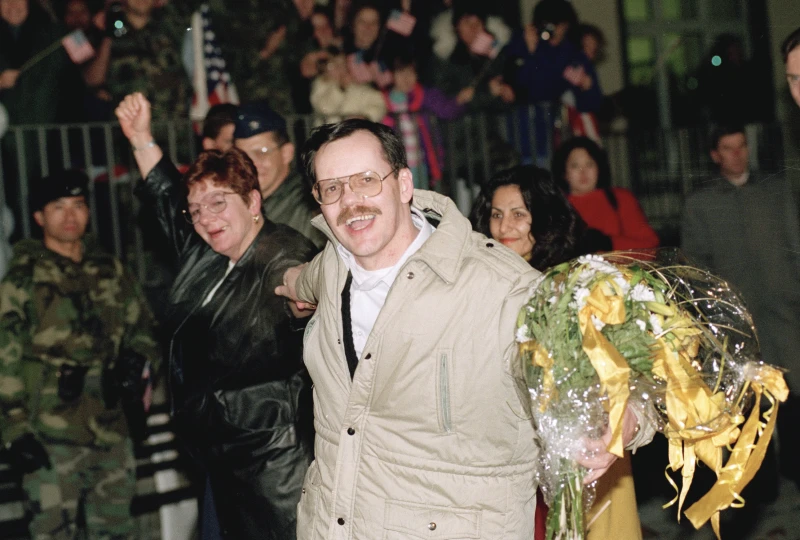Terry Anderson, 1947-2024
The AP journalist taken hostage for almost seven years has died.

Associated Press, “Terry Anderson, AP reporter abducted in Lebanon and held captive for years, has died at 76“
Terry Anderson, the globe-trotting Associated Press correspondent who became one of America’s longest-held hostages after he was snatched from a street in war-torn Lebanon in 1985 and held for nearly seven years, has died at 76.
Anderson, who chronicled his abduction and torturous imprisonment by Islamic militants in his best-selling 1993 memoir “Den of Lions,” died on Sunday at his home in Greenwood Lake, New York, said his daughter, Sulome Anderson.
Anderson died of complications from recent heart surgery, his daughter said.
“Terry was deeply committed to on-the-ground eyewitness reporting and demonstrated great bravery and resolve, both in his journalism and during his years held hostage. We are so appreciative of the sacrifices he and his family made as the result of his work,” said Julie Pace, senior vice president and executive editor of the AP.
“He never liked to be called a hero, but that’s what everyone persisted in calling him,” said Sulome Anderson. “I saw him a week ago and my partner asked him if he had anything on his bucket list, anything that he wanted to do. He said, ‘I’ve lived so much and I’ve done so much. I’m content.’”
After returning to the United States in 1991, Anderson led a peripatetic life, giving public speeches, teaching journalism at several prominent universities and, at various times, operating a blues bar, Cajun restaurant, horse ranch and gourmet restaurant.
He also struggled with post-traumatic stress disorder, won millions of dollars in frozen Iranian assets after a federal court concluded that country played a role in his capture, then lost most of it to bad investments. He filed for bankruptcy in 2009.
[…]
In 1985, Anderson became one of several Westerners abducted by members of the Shiite Muslim group Hezbollah during a time of war that had plunged Lebanon into chaos.
After his release, he returned to a hero’s welcome at AP’s New York headquarters.
Louis D. Boccardi, the president and chief executive officer of the AP at the time, recalled Sunday that Anderson’s plight was never far from his AP colleagues’ minds.
“The word ‘hero’ gets tossed around a lot but applying it to Terry Anderson just enhances it,” Boccardi said. “His six-and-a-half-year ordeal as a hostage of terrorists was as unimaginable as it was real — chains, being transported from hiding place to hiding place strapped to the chassis of a truck, given often inedible food, cut off from the world he reported on with such skill and caring.”
As the AP’s chief Middle East correspondent, Anderson had been reporting for several years on the rising violence gripping Lebanon as the country fought a war with Israel, while Iran funded militant groups trying to topple its government.
On March 16, 1985, a day off, he had taken a break to play tennis with former AP photographer Don Mell and was dropping Mell off at his home when gun-toting kidnappers dragged him from his car.
He was likely targeted, he said, because he was one of the few Westerners still in Lebanon and because his role as a journalist aroused suspicion among members of Hezbollah.
“Because in their terms, people who go around asking questions in awkward and dangerous places have to be spies,“ he told the Virginia newspaper The Review of Orange County in 2018.
What followed was nearly seven years of brutality during which he was beaten, chained to a wall, threatened with death, often had guns held to his head and was kept in solitary confinement for long periods of time.
Anderson was the longest held of several Western hostages Hezbollah abducted over the years, including Terry Waite, the former envoy to the Archbishop of Canterbury, who had arrived to try to negotiate Anderson’s release.
By Anderson’s and other hostages’ accounts, he was also their most hostile prisoner, constantly demanding better food and treatment, arguing religion and politics with his captors, and teaching other hostages sign language and where to hide messages so they could communicate privately.
He lived a rather remarkable life, having already risen to bureau chief at the time of his capture, but is known to most people—and only to those of us of a certain age—because of his capture. As with most people who become famous for some particular incident, it has been a very long time since I paid much attention to him.
It sounds like he led a reasonably content life in the three decades since his release but was, as one would imagine, never truly free of the specter of what he’d endured in Lebanon. It’s a hell of a toll to pay for reporting the news.
To paraphrase a literary character I encountered years ago, “I think God weeps when he looks at Lebanon, because he recognizes it’s a place where the Devil has utterly defeated him.”